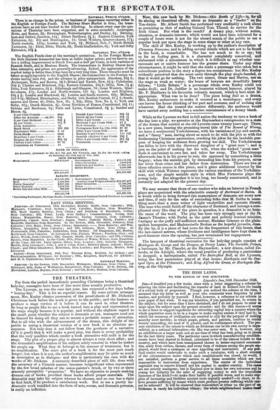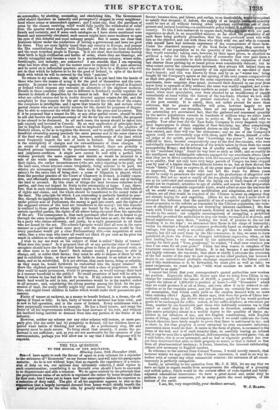THE IRISH LANDS.
TO THE EDITOR OF THE SPECTATOR.
Lincoln's Inn,16th December 1846.
Sin—I troubled you a few weeks since with a letter suggesting a scheme for relieving the titles and facilitating the transfer of land in Ireland into the hands of a solvent body of proprietors. Though you noticed the scheme at the time, I assumed that my letter as well as your own comments were forgotten by your readers, and probably by yourself. I find, however, a reference to my scheme in your paper of last week. It was my intention if you permitted me, to return to the subject; but for some time I have abstained, and I do not propose to enter at large upon the subject upon the present occasion: and for this reason—it seems to me a farce to suggest expedients for attracting capital into a country where the whole population seem to be in a league to make capital useless if they had it; in which the resources of civilization are resorted to only for the purpose of making anarchy more terrible; in which people, priests, and patriots, combine to render bounty unavailing, the need of it greater, and its continuance absurd. The pre- sent exhibition of the extent to which an Irishman can be his own enemy is unpa- ralleled, as a national infatuation—its like was never seen. It is, however, only an exhibition on a larger scale and at one time of what has been going on in pieces for the last thirty years. The particular cases in which manufacturing establish- ments have been started in Ireland, calculated to be of the utmost benefit to the country, and which have been transplanted thence to better-regulated communi- ties, solely from strikes, threats, and every form of violence among the people em- ployed, would form a catalogue at once appalling and instructive. It any poli- tical statist would undertake to make such a catalogue, with a short account of the circumstances under which each establishment was dosed, he would, I am satisfied, perform a great service to all those countries which are not inaccessible to instruction from experience. The course of the individual capitalist was to remove himself and his capital to another country. The cases are not strictly analogous; but is England now to drain her own resources and to cramp her industry for the sake of supplying money to suit the immediate humours of the Irish ?—to make their habits if possible worse, and to make sup- plies of increasing and limitless amount more urgently needed ?—in short, to re- lieve present suffering by means which must produce greater suffering which can- not be relieved ? It will be observed that misconduct or crime on the part of an Irishman is rarely his individual villany; the whole neighbourhood makes itself
an accomplice, by abetting, concealing, and cherishing him. The Government relief should therefore be instantly and peremptorily stopped in every neighbour- hood where crime or misconduct appears; and I must say, that the purchase of arms by the classes receiving relief would fully justify the withdrawal of relief from the quarter where such purchases are rife. If this step were taken uni- formly and certainly, and if some such catalogue as I have above mentioned were framed and extensively circulated, such means might have some tendency to open the eyes of this deluded and most unhappy people. But it seems too clear that Irishmen labour under the misfortune of having a government and laws too good for them. They are more lightly taxed than any country in Europe, and possess the like constitutional freedom with England; yet they are the most disorderly and the most wretched people in Europe. Is it not clear, that institutions having their birth in high civilization and habits of order, where they are blessings, are wholly misapplied and become a curse in a semibarbarous country, where order, forethought, and industry, are unknown? I am sensible that I am repeating what has been often said; but the matter must be repeated till it gain attention and be acted on in influential quarters: and no man is fit to be a Minister who will not do that which he believes to be for the good of Ireland, in spite of the fervid froth with which he will be covered by the Irish " patriots."
To return to my scheme; the object of which is to pat land into the hands of those who have the means of using it for the good of themselves and the com- munity. It cannot be too often repeated, that there is no law of entail in England or Ireland which imposes any restraint on alienation of the slightest moment. Entails in these countries (the case is different in Scotland) merely regulate the descent in default of disposition by the tenant in tail. But if the complaints of what are called estates-tail be in reality directed against estates for life, and the complaint be that tenants for life are unable to sell the whole fee of the estate, the complaint is intelligible; and I agree that tenants for life, and certain other partial owners who are not strictly tenants for life, should for purposes of disposi- tion be able to represent the whole fee that is to fix the price and to convey. But if it be proposed that a tenant for life, or any other partial owner, should be able to sell and receive the purchase-money of the fee for his own benefit, the proposal is too absurd to be discussed. In all such eases, the money should be taken into safe custody and invested in Consols. By an easy application of principles fami- liar to English Equity, such Consols can be impressed with all the qualities of freehold estate, so far as to-regulate the descent, and to modify and distribute the beneficial ownership among precisely the same persons and in the same shares as if the fund were still land. It is not, however, settlements of the land which most frequently impede the sale of lands in Ireland. The real impediment is the multiplicity of charges and the sub-settlements of those charges. In an estate of any considerable magnitude in Ireland, there are probably a hundred persons interested in the purchase-money, as portioners, mortgagees, and judgment-creditors. A single acre cannot be sold with a perfect title without precisely the same expense and trouble as would be incurred in a sale of the whole estate. While these various claimants are scrambling for their rights, the earlier incumbrancers (who are safe) objecting to be paid, and the later ones, whose interest comes irregularly, being anxious to be paid, the estates are mismanaged by receivers, who must be paid (besides an ordinary salary) for the extra risk of being shot: a scene of litigation is played, which, from the peculiar practice of the Court of Chancery in Ireland, is doubly expen- sive, and effectually absorbs every penny which ought to be laid out in turning the land to account. By this state of things the land becomes valueless to all parties, and does not impart its fruits to the community,. at large. I say, there- fore, that in such circumstances, the land ought to he delivered from this hubbub of rights and claims, and the whole should be transferred to the money value of the land. The principle for which Lam contending is perfectly familiar in prac- tice, though its application is limited. In the case of the sale of settled estates under private axle of Parliament, the money is paid into court, and the rights of the supposed owners of the land are transferred to the money: but this transfer is confined to those parties whose rights are bound by the act, who are always certain specified parties, the rights of all others being excepted from the operation of the act. The consequence is, that each purchaser after the act is bound to go through the same investigation of title as if there had been no act; for there may be a party who claims adversely, and justly, by a right paramount to all those who are bound by the act. The scheme I propose would bind all men in the same manner as a private act binds some men; and the consequences would be that every purchaser would get a clear Parliamentary title,—an acquisition of each value, that a wise man who knew all would not think 10 per cent as its price too much in addition to the ordinary purchase-money.
I wish to say one word on the subject of what is called " fixity of tenure." What does this mean? Is it proposed that all or any particular class of tenant- occupiers should have the fee of their farms given to them at the present rents, or at some rents to be now fixed? Such tenants would, I presume, be able to change, sell, or sublet their farms; they must be able to dispose of them by will, and to subdivide them; or they must be liable to descent to an infant or to co- heirs, and so be subdivided. Is it not obvious, that such farms, being so saleable, as they must be, would forthwith be reabsorbed into the larger estates Is there the slightest ground for supposing that such a class of proprietors, even if they could be made permanent, would be prosperous, or would manage their land in a manner beneficial to the public No small proprietor of land will be able to keep it unless he has had the thrift to buy it. If my scheme were in operation, much land would be sold in lots, and possessions would be in the market suited to all persons; and, considering the strong passion among the Irish for the pos- session of land, the really thrifty might buy small farms for their own occupa- tion, and might breed children in habits which would make their possessions per- manent.
Fixity of tenure at rackrent, as a means to benefit Ireland, is a dream, the off- spring of nand or folly. In fact, fixity of tenure at rackrent has been tried, and is now in full operation, and is the curse of Ireland. Every middleman with a lease perpetualiy renewable is an example. He has a fixed tenure, and reaps the fruits of all his improvements without the least increase of his rent, and without his landlord being entitled to demand from him any portion of the fruits of his industry.
However, neither my scheme nor any other scheme will restore, or more pro- perly give (for she never had it) prosperity to Ireland, till her children have ac- quired wiser habits of thinking and acting. As a preliminary step, life and property must be made secure. To bring about that security, it seems the po- liceman is not sufficient; and, as you are not answerable for the opinions of your correspondents, perhaps you will allow me to say that I think dragoons will be































 Previous page
Previous page